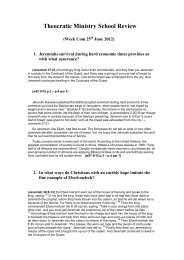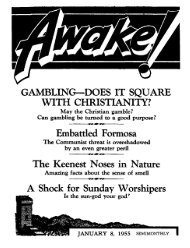1964 Awake! - Theocratic Collector.com
1964 Awake! - Theocratic Collector.com
1964 Awake! - Theocratic Collector.com
Create successful ePaper yourself
Turn your PDF publications into a flip-book with our unique Google optimized e-Paper software.
JESUS CHRIST, in prayer to his Father<br />
on the night of his betrayal, said, among<br />
other things. "Your word is truth." Therefore<br />
all who would be his followers must,<br />
to be consistent, accept God's Word, the<br />
Bible, as truth.-John 17:17.<br />
But not so, says the modernist clergyman.<br />
Although claiming to be a Christian,<br />
he denies the inspiration of the Bible. And<br />
he considers the Bible to be the work not<br />
only of imperfect men hut of dishonest men<br />
at that. Thus a certain clergyman of the<br />
Church of Scotland claims to have scientific<br />
evidence that, of all the letters credited<br />
to the apostle Paul, only Romans, First<br />
and Second Corinthians, Galatians and perhaps<br />
Philemon were actually written by<br />
Paul and that the rest were written by<br />
several others.<br />
But how could this be if God's "word<br />
is truth"? Of the fourteen letters credited<br />
to Paul thirteen mention Paul as the writer<br />
from one to three times. Are we to conclude<br />
that all this logical Scriptural exposition,<br />
all this fine admonition is the<br />
work of forgers, a number of them at that,<br />
and yet writing so much alike? Every time<br />
Paul's name is mentioned in these letters<br />
it represents a lie if Paul did not write<br />
them.<br />
More than that, there are ever so many<br />
personal references in these letters, as<br />
when Paul refers to his prison bonds and<br />
his being acquainted with Timothy's mother<br />
and grandmother. If Paul did not write<br />
MAY 8, <strong>1964</strong><br />
these letters, then all such references are<br />
lies. And what about his use of the personal<br />
pronoun? In the letter to the Philippians<br />
alone he uses "I" more than sixty<br />
times. If he ,did not write that letter, then<br />
everyone of those sixty "I's" represents a<br />
lie.<br />
On what basis does this clergyman rest<br />
his radical conclusions? To quote him:<br />
"The results are convincing. The work is<br />
based on the principle that authors have<br />
certain habits of style deeply ingrained. For<br />
the present study we have considered such<br />
things as the space between the uses of the<br />
word 'and,' r('pctitive uses of the word, sentences<br />
beginning with the word and so on."<br />
By checking some dozen classical Greek<br />
writers, such as Aristotle, Plato and Socrates,<br />
and finding that each one of these<br />
writers has his o\vn way of using this<br />
Greek conjunction kal, he evolved a hypothesis<br />
that he tried out on the writings of<br />
Paul. In doing this work he depended upon<br />
an electrical <strong>com</strong>puter.-Toronto, Canada,<br />
Globe and Mail, February 26, 1963.<br />
What about this hypothesis? Is it sound?<br />
Must we conclude, on the basis of his style,<br />
that the nine or ten letters following Galatians<br />
in our Bibles were not written by<br />
Paul? Does the use of the very <strong>com</strong>mon<br />
Greek word kal, which may be translated<br />
not only "and" but "also," "even," and so<br />
forth, dictate this? No, and that for very<br />
<strong>com</strong>pelling reasons. The hypothesis is entirely<br />
unsound, for it makes <strong>com</strong>parisons<br />
between things that are not <strong>com</strong>parable.<br />
There is no question about the classical<br />
Greek writers, whose \vorks he used to<br />
develop his theory, having certain definite<br />
individual styles. For one thing, they<br />
wrote a great deal. They were concerned<br />
with style, with producing fine literature,<br />
with making a name for themselves as<br />
writers and so took time to stamp their individuality<br />
upon their works.<br />
How different from all these was the<br />
apostle Paul! In the first place, he was not<br />
27




